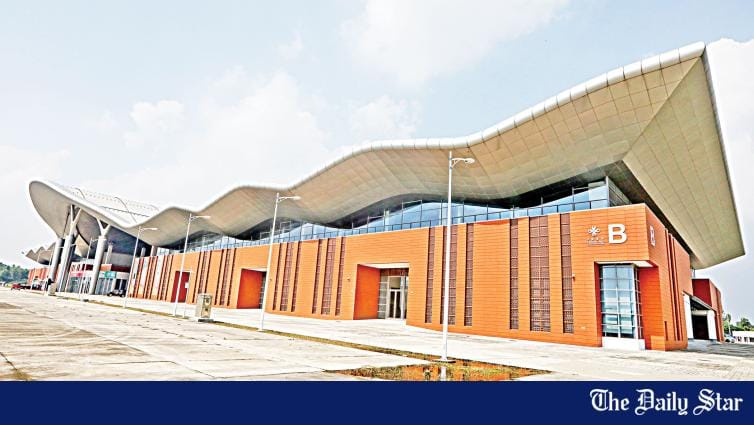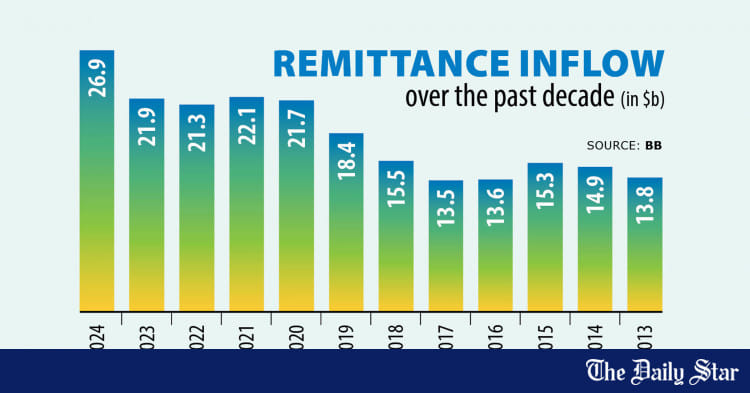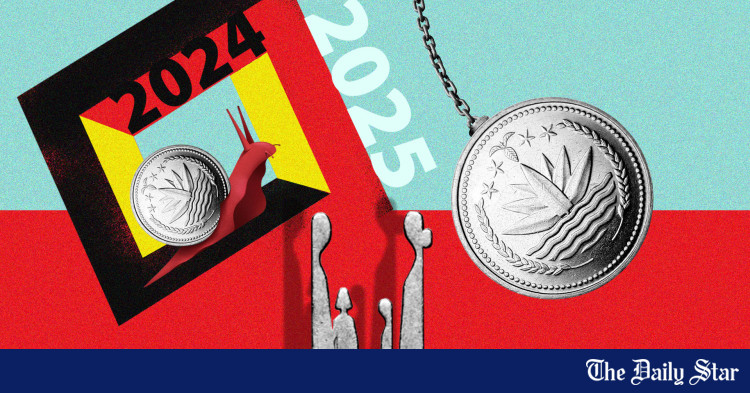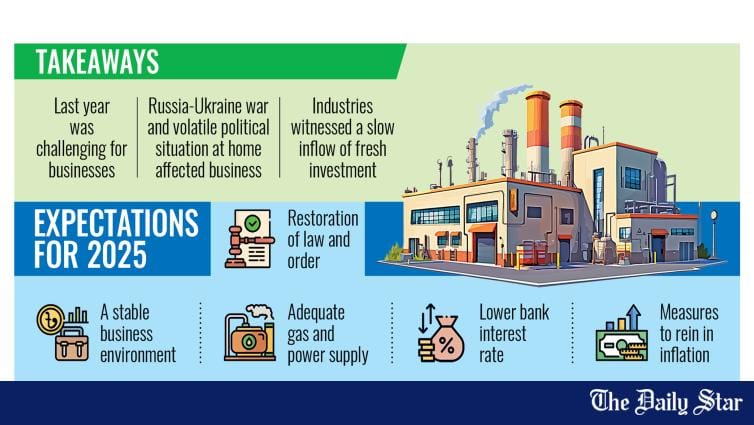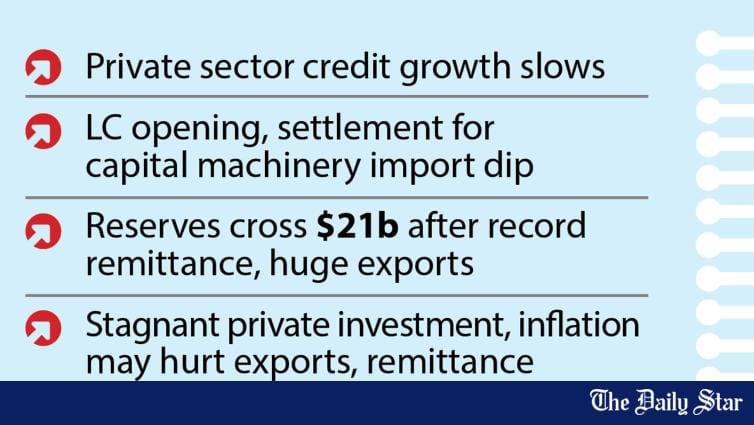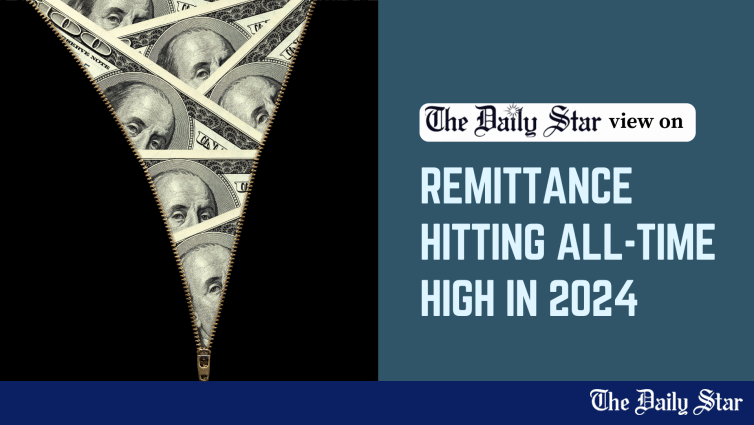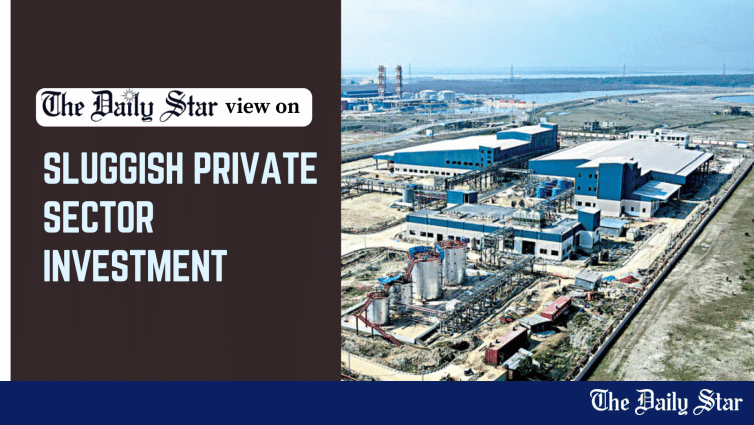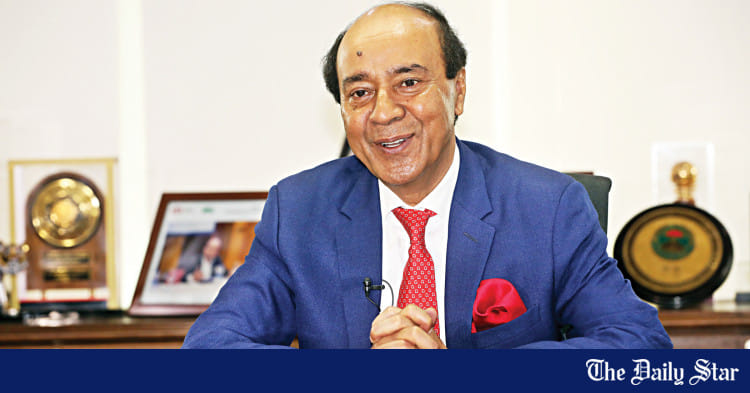- Copy to clipboard
- Thread starter
- #421

How embedded finance can unlock Bangladesh's economic potential
Embedded finance is the seamless integration of financial products or services into nonfinancial company's platforms or apps. Embedded finance is a very popular business model in the world for its frictionless payment experience. And that is why, several giant companies like Uber, Amazon, Apple, Te
How embedded finance can unlock Bangladesh's economic potential
Zia Hassan Siddique, ASM Ahsan Habib and Sanjoy Pal
Published :
Dec 28, 2024 22:05
Updated :
Dec 28, 2024 22:06

Embedded finance is the seamless integration of financial products or services into nonfinancial company's platforms or apps. Embedded finance is a very popular business model in the world for its frictionless payment experience. And that is why, several giant companies like Uber, Amazon, Apple, Tesla have adopted it considering the various advantages of this model.
Embedded finance helps to generate revenue for service providers and banks by offering differentiated products to new customers. A study by 'Research and Markets', a global leader in market research, reveals that embedded finance opportunity in Bangladesh market is approximately US$ 817.10 million by 2024 with a projected annual increase of 28.5 per cent. The industry is predicted to maintain a compounded annual growth rate (CAGR) of 48.0 per cent from 2024 to 2029 and the expansion is forecast to be worth US$5.80 billion by the end of the period.
EMBEDDED PAYMENTS: SCOPE FOR FINANCIAL INCLUSION AND MARKET EXPANSION: Embedded payments, instead of redirecting users to separate payment gateways or banking applications, allow transactions to occur naturally within the user's current environment, whether it's an e-commerce platform, ride-hailing app, or social media marketplace.
Bangladesh is a rising economy with around 6 million SMEs and growing middle class with around 5 million Gen Z population. The vibrant consumer and SME sector is yet to utilise the full potential of transaction velocity because of the lack of embedded payment infrastructure, process and policies. Currently, few platforms like bKash and Nagad, to some extent, have successfully integrated their payment systems into various applications. However, the majority of digital transactions still occur through standalone payment apps or traditional banking channels, indicating substantial room for growth in embedded payment adoption.
Successful case studies from neighbouring countries provide valuable insights for Bangladesh. India's unified payments interface (UPI) has enabled seamless embedded payments across numerous platforms, from small merchant QR codes to large e-commerce websites. Similarly, Indonesia's transformation through platforms like Gojek and GrabPay demonstrate how embedded payments can drive digital economy growth in a market with similar demographic characteristics as in Bangladesh. Vietnam offers perhaps the most relevant case study, having successfully integrated embedded payments into social commerce platforms. Their experience shows how combining social media, e-commerce, and payments can accelerate digital payment adoption in a developing market. By 2022, over 45 per cent of Vietnamese consumers were using embedded payment solutions in social commerce, making it a global leader in this technological integration. Bangladesh could adapt this model by encouraging social commerce platforms to integrate payment capabilities, particularly given the country's high social media penetration rate.
Under the leadership of Bangladesh Bank, the regulatory environment is gradually adapting to support digital payment innovation, which is really encouraging. The introduction of the National Payment Switch Bangladesh (NPSB) and the regulatory sandbox for fintech innovations has created a foundation for expanding embedded payment solutions. Nevertheless, challenges persist in terms of infrastructure readiness, regulatory compliance requirements and merchant adoption.
To replicate successes of other countries, Bangladesh needs to focus on three key areas. First, developing robust API infrastructure to enable easy integration of payment services into various platforms. Second, creating clear regulatory guidelines that balance innovation with security. Third, incentivising merchants and platforms to adopt embedded payment solutions through reduced transaction fees and simplified onboarding processes. The mobile-first nature of Bangladesh's internet users presents a particular opportunity, as embedded payments can be naturally integrated into the apps and services that consumers use daily. This aligns with successful models seen in countries like Indonesia and Vietnam, where mobile-based embedded payments have driven significant financial inclusion.
EMBEDDED INSURANCE: ACCESS TO RISK MINIMISATION THROUGH DIGITAL PLATFORM: There are a total of 81 insurance companies in Bangladesh, including 35 life and 46 non-life insurance companies serving about 18.97 million through different insurance products. Life insurance companies occupy 74 per cent of the market share and non-life insurance companies only 26 per cent. Another popular insurance service is Bancassurance (Banks financial service that combines banking and insurance services). Despite being a very important sector in the world, insurance is still neglected in Bangladesh and insurance is not becoming popular in this country. So, is our country's market not suitable for insurance or are we not able to take the initiatives that should be taken to make the insurance market popular? Embedded insurance can help this sector become popular. Embedded insurance is another application of Embedded Finance where customer can also avail insurance products at the time of main product purchase from non-financial companies. There are opportunities for embedded insurance in many sectors ranging from Consumer Products, Travel & Hospitality, Healthcare, Real Estate and Transport & Logistics. The customer does not have to approach the insurance provider for the services. As of last November, 6.20 million motor vehicles were registered in the country and registration is ongoing. If these motor vehicle registrations are through embedded insurance, the motor insurance process for customers will be simplified and the government will also receive more revenue. Another popular sector in the country is real estate. If there is a partnership between real estate and residential real estate brokers, they can get real estate insurance through embedded insurance. Life and health insurance can embed through E-commerce platforms, especially those selling wellness products, offer life and health insurance at the point of sale. Embedded insurance can also be in travel. Travel booking sites can integrate travel insurance directly into their booking system.
EMBEDDED LENDING: EXPANSION OF DIGITAL LENDING THROUGH CREDIT SCORING MECHANISM: Embedded lending is the integration of different types of lending services into nonfinancial platforms or applications. The technological transformation of conventional lending comes up with digital lending solution in the financial industry. The use of artificial intelligence (AI) technology has enriched the inclusive financing area through a credit scoring system to assess the eligibility of a prospective borrower to borrow along with identify the repayment capacity.
Digital credit scoring is an integral part of digital lending which uses various components such as personal data, financial structure, credit history etc., to lend a customer through digital means rather than using in-person approach. Digital banks offer retail loans, credit cards as well as Micro, Small and Medium enterprise (MSME) loans worldwide through the mechanism of embedded lending. The tech-driven method not only reshaped the traditional financing approach, but also unlocked the potential of inclusive market in developing countries. The main asset of the digital lending approach is data using which a lender or sometimes a protective borrower identifies own position to borrow funds through credit scoring.
Digital lending runs not only on the wheel of digital credit scoring method, but also infuses algorithm for rendering tailored products and services. These data driven methods let individuals to easily assess eligibility for borrowing from financial institutions. The platform facilitates personalised lending, micro lending, MSME lending, supply chain lending, trade financing etc. The Artificial Intelligence (AI) based application here represents a user-friendly interface where a prospect can easily submit a complete application for loan anytime from anywhere. At present, small businesses capture the large portion of total businesses in the world in terms of number and entrepreneurial engagements. The digital lending platform analyses data from various sources and also financial psychology through internet footprints and through data available in the credit bureau operated in a country and finally provides the available lending solutions to the customers through AI. Digital lending mechanism excludes the human interaction and minimises the human errors. Besides, it improves the financing process through the accessibility, speed, lower costs etc. that leads to positive customer experience of a financier.
Embedded finance is not limited to payments, lending and insurance but has its scope in many other sectors. If the implementation of embedded finance in the MSME sector is ensured, this sector can achieve significant growth fostering overall economic growth of the country.. Bangladesh as a growing economy must actively take measures to implement embedded finance ecosystem to reap the benefits and achieve sustainable economic growth.
Zia Hassan Siddique is a banker turned fintech entrepreneur. Co-founder of Dana Fintech, Bangladesh and Kube Innovation, UK. A. S. M. Ahsan Habib is a banker and Certified Digital Finance Practitioner (CDFP). Sanjoy Pal is a banker and Financial Modeling & Valuation Analyst (FMVA®) certified from Corporate Finance Institute, Canada.
Zia Hassan Siddique, ASM Ahsan Habib and Sanjoy Pal
Published :
Dec 28, 2024 22:05
Updated :
Dec 28, 2024 22:06
Embedded finance is the seamless integration of financial products or services into nonfinancial company's platforms or apps. Embedded finance is a very popular business model in the world for its frictionless payment experience. And that is why, several giant companies like Uber, Amazon, Apple, Tesla have adopted it considering the various advantages of this model.
Embedded finance helps to generate revenue for service providers and banks by offering differentiated products to new customers. A study by 'Research and Markets', a global leader in market research, reveals that embedded finance opportunity in Bangladesh market is approximately US$ 817.10 million by 2024 with a projected annual increase of 28.5 per cent. The industry is predicted to maintain a compounded annual growth rate (CAGR) of 48.0 per cent from 2024 to 2029 and the expansion is forecast to be worth US$5.80 billion by the end of the period.
EMBEDDED PAYMENTS: SCOPE FOR FINANCIAL INCLUSION AND MARKET EXPANSION: Embedded payments, instead of redirecting users to separate payment gateways or banking applications, allow transactions to occur naturally within the user's current environment, whether it's an e-commerce platform, ride-hailing app, or social media marketplace.
Bangladesh is a rising economy with around 6 million SMEs and growing middle class with around 5 million Gen Z population. The vibrant consumer and SME sector is yet to utilise the full potential of transaction velocity because of the lack of embedded payment infrastructure, process and policies. Currently, few platforms like bKash and Nagad, to some extent, have successfully integrated their payment systems into various applications. However, the majority of digital transactions still occur through standalone payment apps or traditional banking channels, indicating substantial room for growth in embedded payment adoption.
Successful case studies from neighbouring countries provide valuable insights for Bangladesh. India's unified payments interface (UPI) has enabled seamless embedded payments across numerous platforms, from small merchant QR codes to large e-commerce websites. Similarly, Indonesia's transformation through platforms like Gojek and GrabPay demonstrate how embedded payments can drive digital economy growth in a market with similar demographic characteristics as in Bangladesh. Vietnam offers perhaps the most relevant case study, having successfully integrated embedded payments into social commerce platforms. Their experience shows how combining social media, e-commerce, and payments can accelerate digital payment adoption in a developing market. By 2022, over 45 per cent of Vietnamese consumers were using embedded payment solutions in social commerce, making it a global leader in this technological integration. Bangladesh could adapt this model by encouraging social commerce platforms to integrate payment capabilities, particularly given the country's high social media penetration rate.
Under the leadership of Bangladesh Bank, the regulatory environment is gradually adapting to support digital payment innovation, which is really encouraging. The introduction of the National Payment Switch Bangladesh (NPSB) and the regulatory sandbox for fintech innovations has created a foundation for expanding embedded payment solutions. Nevertheless, challenges persist in terms of infrastructure readiness, regulatory compliance requirements and merchant adoption.
To replicate successes of other countries, Bangladesh needs to focus on three key areas. First, developing robust API infrastructure to enable easy integration of payment services into various platforms. Second, creating clear regulatory guidelines that balance innovation with security. Third, incentivising merchants and platforms to adopt embedded payment solutions through reduced transaction fees and simplified onboarding processes. The mobile-first nature of Bangladesh's internet users presents a particular opportunity, as embedded payments can be naturally integrated into the apps and services that consumers use daily. This aligns with successful models seen in countries like Indonesia and Vietnam, where mobile-based embedded payments have driven significant financial inclusion.
EMBEDDED INSURANCE: ACCESS TO RISK MINIMISATION THROUGH DIGITAL PLATFORM: There are a total of 81 insurance companies in Bangladesh, including 35 life and 46 non-life insurance companies serving about 18.97 million through different insurance products. Life insurance companies occupy 74 per cent of the market share and non-life insurance companies only 26 per cent. Another popular insurance service is Bancassurance (Banks financial service that combines banking and insurance services). Despite being a very important sector in the world, insurance is still neglected in Bangladesh and insurance is not becoming popular in this country. So, is our country's market not suitable for insurance or are we not able to take the initiatives that should be taken to make the insurance market popular? Embedded insurance can help this sector become popular. Embedded insurance is another application of Embedded Finance where customer can also avail insurance products at the time of main product purchase from non-financial companies. There are opportunities for embedded insurance in many sectors ranging from Consumer Products, Travel & Hospitality, Healthcare, Real Estate and Transport & Logistics. The customer does not have to approach the insurance provider for the services. As of last November, 6.20 million motor vehicles were registered in the country and registration is ongoing. If these motor vehicle registrations are through embedded insurance, the motor insurance process for customers will be simplified and the government will also receive more revenue. Another popular sector in the country is real estate. If there is a partnership between real estate and residential real estate brokers, they can get real estate insurance through embedded insurance. Life and health insurance can embed through E-commerce platforms, especially those selling wellness products, offer life and health insurance at the point of sale. Embedded insurance can also be in travel. Travel booking sites can integrate travel insurance directly into their booking system.
EMBEDDED LENDING: EXPANSION OF DIGITAL LENDING THROUGH CREDIT SCORING MECHANISM: Embedded lending is the integration of different types of lending services into nonfinancial platforms or applications. The technological transformation of conventional lending comes up with digital lending solution in the financial industry. The use of artificial intelligence (AI) technology has enriched the inclusive financing area through a credit scoring system to assess the eligibility of a prospective borrower to borrow along with identify the repayment capacity.
Digital credit scoring is an integral part of digital lending which uses various components such as personal data, financial structure, credit history etc., to lend a customer through digital means rather than using in-person approach. Digital banks offer retail loans, credit cards as well as Micro, Small and Medium enterprise (MSME) loans worldwide through the mechanism of embedded lending. The tech-driven method not only reshaped the traditional financing approach, but also unlocked the potential of inclusive market in developing countries. The main asset of the digital lending approach is data using which a lender or sometimes a protective borrower identifies own position to borrow funds through credit scoring.
Digital lending runs not only on the wheel of digital credit scoring method, but also infuses algorithm for rendering tailored products and services. These data driven methods let individuals to easily assess eligibility for borrowing from financial institutions. The platform facilitates personalised lending, micro lending, MSME lending, supply chain lending, trade financing etc. The Artificial Intelligence (AI) based application here represents a user-friendly interface where a prospect can easily submit a complete application for loan anytime from anywhere. At present, small businesses capture the large portion of total businesses in the world in terms of number and entrepreneurial engagements. The digital lending platform analyses data from various sources and also financial psychology through internet footprints and through data available in the credit bureau operated in a country and finally provides the available lending solutions to the customers through AI. Digital lending mechanism excludes the human interaction and minimises the human errors. Besides, it improves the financing process through the accessibility, speed, lower costs etc. that leads to positive customer experience of a financier.
Embedded finance is not limited to payments, lending and insurance but has its scope in many other sectors. If the implementation of embedded finance in the MSME sector is ensured, this sector can achieve significant growth fostering overall economic growth of the country.. Bangladesh as a growing economy must actively take measures to implement embedded finance ecosystem to reap the benefits and achieve sustainable economic growth.
Zia Hassan Siddique is a banker turned fintech entrepreneur. Co-founder of Dana Fintech, Bangladesh and Kube Innovation, UK. A. S. M. Ahsan Habib is a banker and Certified Digital Finance Practitioner (CDFP). Sanjoy Pal is a banker and Financial Modeling & Valuation Analyst (FMVA®) certified from Corporate Finance Institute, Canada.




